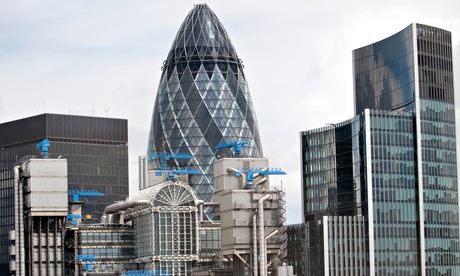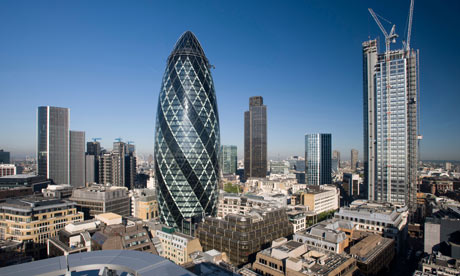Gherkin's salad days over amid financial pickle for London tower
04-26-2014
Owners of landmark expect offers around £550m after currency fluctuations force them to sell, acording to Deloitte
Terry Macalister and Julia Kollewe
The Guardian

The Gherkin
The Gherkin in London. Photograph: Alamy
The Gherkin, voted London's favourite tower, has been put into receivership 10 years after its completion helped transform the capital's skyline.
The 41-storey City landmark is likely to be put up for sale shortly and is expected to attract offers of more than £550m from Middle East sovereign wealth funds and other potential buyers.
Deloitte, appointed to take control of the tower, said the Gherkin's co-owners – a Mayfair-based investment bank and a German property investor, IVG Immobilien – had run into problems related to currency issues, rather than any difficulties with the wider property market.
Changing exchange rates had inflated the size of the original loan and the owners failed to make debt payments as they became due on several occasions.
Phil Bowers, one of the Deloitte receivers, said: "This is a building in trophy condition whose space is 99% leased. The multi-currency deal that financed the Gherkin has been affected by the substantial appreciation of the Swiss franc against the pound."
Gherkin

The Gherkin has run into trouble at a time when dozens of new skyscrapers are planned. Photograph: Grant Smith/Alamy
The first 15 floors of the Norman Foster-designed skyscraper are occupied by the insurer Swiss Re, which originally owned the building. It sold out to IVG and its investment bank partner, Evans Randall, in 2007 for £630m.
Deloitte said the tenants, who also include Sky News and the highest private club in London, would not be affected by the receivership. The Gherkin, which is also used as a wedding venue, has not yet been put on the market, but a sale process is likely to start in the coming months.
Swiss Re spent about £238m building the Gherkin on the site at St Mary Axe of the Baltic Exchange shipping market, which was badly damaged by an IRA bomb attack in 1992.
James Roberts, head of commercial property research at Knight Frank, said Deloitte would have no problem finding new buyers for the Gherkin. "The commercial property sector follows the general economic cycle and at the moment the central London economy is doing well and the City is improving. The EC3 postcode around the Gherkin is always slightly warmer than others because they are close to the Lloyd's of London insurance market which still uses face to face trading," he said.
It could be sold to a large global pension fund, or a US private equity house, but it was more likely that well-funded sovereign wealth funds from the Middle East or Asia would swoop, he added.
In December an investment firm owned by the Singapore government bought a half share of the massive Broadgate development in London for £1.7bn. Kuwait spent a similar amount buying an office complex next to Tower Bridge.
In 2013 commercial property investment in the UK hit £53bn – mostly deals in London and the south-east – which was the highest since the financial crisis of 2008. But there were also warnings last night about the likelihood of the Gherkin's financing problems not being the last.
Glyn Mummery, a partner at FRP Advisory, which helps with financial restructuring, said the multi-currency financial arrangements in place at the Gherkin were not uncommon in big London property deals and there could be further casualties. "We expect similar crunch times ahead for overseas investors who have misjudged their currency arrangements."
The Gherkin, which has won multiple awards, has run into trouble at a time when dozens of new skyscrapers are planned. Boris Johnson, the mayor, has been accused of being too eager to allow developers to change the skyline.
The rash of buildings with nicknames such as the Cheesegrater and Walkie Talkiehave attracted criticism, some of it from Prince Charles.

